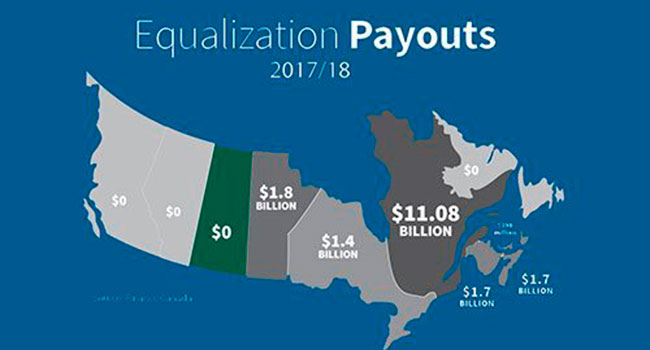 Here’s a fundamental point about equalization: the provincial government doesn’t pay for equalization, taxpayers do. Premier Jason Kenney is calling on the feds to increase the equalization rebate to the Alberta government to offset some of the impacts of the downturn. But any equalization rebate should go back to the Albertans who have been paying the tab, not to provincial government coffers.
Here’s a fundamental point about equalization: the provincial government doesn’t pay for equalization, taxpayers do. Premier Jason Kenney is calling on the feds to increase the equalization rebate to the Alberta government to offset some of the impacts of the downturn. But any equalization rebate should go back to the Albertans who have been paying the tab, not to provincial government coffers.
The fiscal stabilization program, or equalization rebate as Kenney has called it, is a federal program designed to provide money to provincial governments that experience significant economic shocks, such as Alberta’s 2014 oil price collapse. Kenney’s main thorn with the program is that its $60 per person cap severely limits the amount of money that has been transferred back to Alberta.
The Fair Deal panel’s very first recommendation notes that if restrictions were lifted from the equalization rebate then Alberta would receive $2.4 billion from the feds. Research presented by Fairness Alberta shows that the Alberta government should actually receive $7 billion.
Ultimately, this rebate addresses symptoms. Equalization needs an overhaul and needs to shrink. But short-term relief is not an insignificant objective while pushing for real reform. And Kenney is right to try to bring home more of Albertans’ federal tax dollars.
Since 1961, Albertans have paid $661 billion more to Ottawa – and by extension to the other provinces – than we have received back in federal spending. Even during the downturn that ravaged Alberta families and businesses, we still punched above our weight for the rest of Canada.
But because the Alberta government doesn’t pay for equalization or send cheques to the feds, it shouldn’t receive the equalization rebate.
“It’s a big myth that [the] Alberta [government] sends equalization payments to Ottawa,” explains University of Alberta political scientist Jared Wesley. “Albertans as individuals and their corporations pay income taxes directly to the federal government, and the federal government then sends some of that money out to other provinces.”
If the feds send the larger equalization rebate to Alberta, then it should be made out to the taxpayers who have been paying the bills.
The increased equalization rebate could put about $540 to $1,580 back into the pockets of each Albertan depending on whether the feds send the $2.4 billion referenced by the Fair Deal Panel or $7 billion referenced by Fairness Alberta. Either way, the thousands of dollars that families could receive would go a long way in helping Albertans survive this downturn.
The Alberta government will want to keep the equalization rebate to delay the inevitable big spending cuts. But it’s long past time for the province to fix its budget by dealing with the spending problem instead of grasping for more tax dollars.
If the Alberta government’s per person expenses mirrored British Columbia’s spending, it would spend $15 billion less every year, according to the Blue Ribbon Panel. In 2018, even with relatively low non-renewable resource revenues, the Alberta government still brought in more revenue per person than B.C. did.
While the larger equalization rebate would be helpful given Alberta’s dire situation, it’s not something any province should look forward to.
The negative incentives from equalization are well-known: have-not governments begin to rely more on tax dollars collected from other provinces and less on growing their own economies. But the equalization rebate also creates bad incentives by giving have provinces greater leeway to rely less on good budgeting and saving for a rainy day and to rely more on Ottawa. In reality, Alberta can’t rely on Ottawa to fix problems caused by the province’s overspending.
Removing the equalization rebate’s cap would provide needed relief and Kenney should make sure the rebates get to the families that paid for the province’s oversized contribution to the feds. However, true reform must be directed at reducing the amount of money Ottawa takes in the first place, scaling back equalization and making sure Alberta’s politicians don’t overspend during boom years.
Franco Terrazzano is the Alberta Director of the Canadian Taxpayers Federation.
Franco is a Troy Media Thought Leader. Why aren’t you?
The views, opinions and positions expressed by columnists and contributors are the author’s alone. They do not inherently or expressly reflect the views, opinions and/or positions of our publication.


